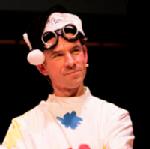Virus Hunters - Engagement through citizen science
Saskia Bakker (Advanced Bioimaging)
"I love playing with the electron microscopes in the Advanced Bioimaging RTP and I'm fascinated by viruses. I've been involved in engagement since my PhD and now run 'Virus Hunters' to find viruses in pond water. I especially enjoy encouraging primary school children to investigate the world around them."
Ian Hands-Portman (Life Sciences)
"People know me as the slime mould guy but there’s more to life than maze solving amoebae. I’ve run ultrasounds scans on pregnant jelly babies at the Big Bang Fair, trawled the depths of school ponds for rare and exotic viruses, stormed goblin castles with Roman siege engines and performed late night comedy routines on the mating habits of bees. I believe knowledge should be freely and openly shared and that as a university we have a duty to engage with the public."
Saskia and Ian are both WIE Fellows, and technicians working in our Life Sciences department. In 2018, using public engagement seed funding, they created a pilot scheme to test out if they could use Citizen Science for an engagement project about finding viruses in bodies of water. Covid made it difficult to expand the project but here are their learnings from the pilot scheme:

The project:
When you think about life in a pond or lake, it's probably ducks or fish that spring to mind. But they are massively outnumbered by the invisible bacteria and viruses. Few people realise the mind-blowing abundance of viruses in our environment. Every day around 800 million land on every square meter of the earth, a millilitre of seawater can contain tens of millions of them, the local pond is basically viral soup.
We wanted to raise public awareness of viruses – specifically bacteriophage, just how common they are and how important they are both as potential disease treatments and as vectors for spreading antibiotic resistance and disease causing genes.
This project is unique because members of the public can provide samples AND help with data analysis. The results – aside from just keeping an eye out for anything unusual (we’ve found phage normally associated with hot springs and several species of giant virus) - will be used to build up a database of morphology by post code & water type to look for any correlations.
We worked with primary school groups to collect and submit samples, and engaged adults to help with the data analysis using a tool called ZooniverseLink opens in a new window. Zooniverse is an online platform which allows anyone to create an account and get stuck in with research. They get given an online tutorial to show them what you need them to look for and then they can look at images/ data sets etc. to help spot patterns.
Who we aimed to engage:
We wanted to increase knowledge of microbiology and specifically the large number of bacteria and viruses in the environment and the difference between them. We envisaged two groups: primary school groups submitting the water and adults with time on their hands for the Zooniverse part of the project.
Why we chose Citizen Science:
Citizen science was the right fit because we wanted a geographical spread of samples and we were getting too much data to handle, plus we hoped being actively involved in a project would help people engage with it whereas just being told doesn’t.
What would we do differently:
- Working with ZooniverseLink opens in a new window has been good, although we still need to work out exactly what we want the data to look like. We also need to incorporate the feedback from the beta-users to make the project more appealing and sustainable for people to participate in.
- Working with schools was tricky, the response rate was lower than expected, presumably due to scheduling issues. This meant we lost a number of the water collections kits and stamps that we sent out but never got back. We’ll need to take this into account next time when determining numbers.
- Some setbacks beyond our control: the global pandemic did not help, and we were due to perform a stage show at the Warwick Family Day in September 2019 which sadly got cancelled at the last minute - the stage show would have been a good promotion opportunity for the project.
Read the virus hunters webcomic
All images the images and comics used in this case study where created by Ian Hands-Portman

